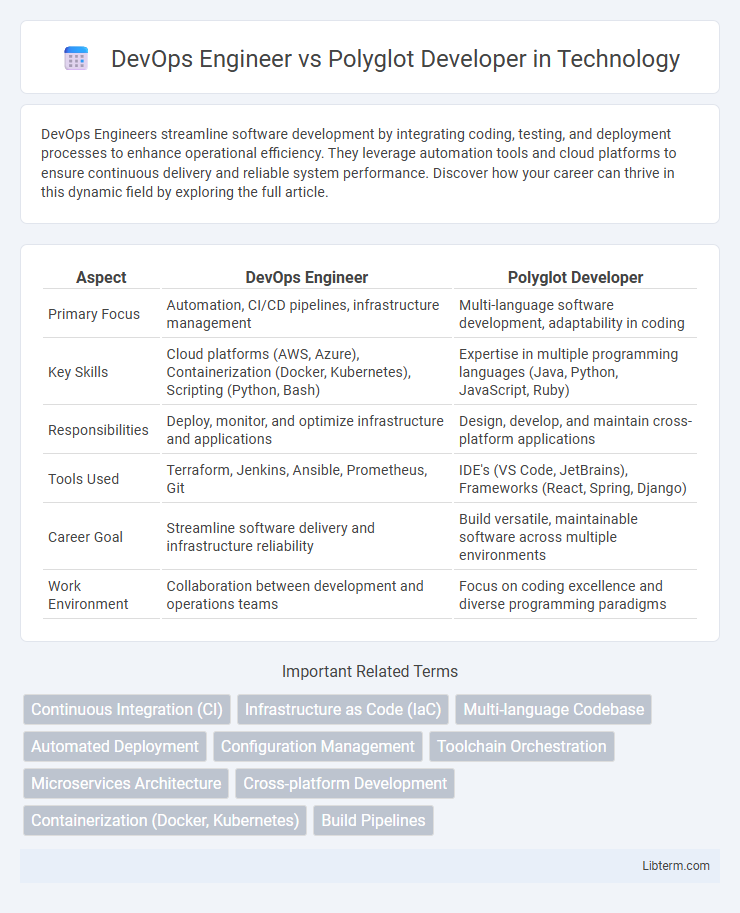DevOps Engineers streamline software development by integrating coding, testing, and deployment processes to enhance operational efficiency. They leverage automation tools and cloud platforms to ensure continuous delivery and reliable system performance. Discover how your career can thrive in this dynamic field by exploring the full article.
Table of Comparison
| Aspect | DevOps Engineer | Polyglot Developer |
|---|---|---|
| Primary Focus | Automation, CI/CD pipelines, infrastructure management | Multi-language software development, adaptability in coding |
| Key Skills | Cloud platforms (AWS, Azure), Containerization (Docker, Kubernetes), Scripting (Python, Bash) | Expertise in multiple programming languages (Java, Python, JavaScript, Ruby) |
| Responsibilities | Deploy, monitor, and optimize infrastructure and applications | Design, develop, and maintain cross-platform applications |
| Tools Used | Terraform, Jenkins, Ansible, Prometheus, Git | IDE's (VS Code, JetBrains), Frameworks (React, Spring, Django) |
| Career Goal | Streamline software delivery and infrastructure reliability | Build versatile, maintainable software across multiple environments |
| Work Environment | Collaboration between development and operations teams | Focus on coding excellence and diverse programming paradigms |
Introduction to DevOps Engineers and Polyglot Developers
DevOps Engineers specialize in automating software development and IT operations processes to enhance collaboration, continuous integration, and continuous delivery. Polyglot Developers possess expertise in multiple programming languages, enabling them to select the best tools and frameworks for diverse project requirements. Both roles emphasize efficiency, but DevOps Engineers focus on workflow optimization while Polyglot Developers prioritize versatile coding skills.
Core Responsibilities Compared
DevOps Engineers primarily focus on automating infrastructure, continuous integration and delivery (CI/CD), and monitoring system performance to ensure reliable software deployment. Polyglot Developers specialize in writing code across multiple programming languages, enabling versatile application development and integration of diverse technologies. While DevOps emphasizes operational efficiency and deployment pipeline optimization, Polyglot Developers prioritize coding adaptability and multilingual software solutions.
Key Skill Sets: DevOps vs Polyglot Developer
DevOps Engineers excel in automation, continuous integration/continuous deployment (CI/CD) pipelines, infrastructure as code (IaC), and cloud platform management, ensuring seamless software delivery and operational stability. Polyglot Developers possess expertise in multiple programming languages and frameworks, enabling flexible and efficient software development across diverse technology stacks. While DevOps focuses on system scalability, monitoring, and collaboration between development and operations, Polyglot Developers prioritize adaptability in coding and rapid implementation of multiparadigm solutions.
Tools and Technologies: Overlapping & Unique
DevOps Engineers primarily utilize tools like Jenkins, Docker, Kubernetes, Ansible, and Terraform to automate deployment, manage infrastructure, and ensure continuous integration and delivery. Polyglot Developers specialize in multiple programming languages such as Python, JavaScript, Java, and Ruby, leveraging frameworks like React, Spring, and Django to build versatile applications across tech stacks. Both roles overlap in using containerization and cloud services, but DevOps focuses on automation and orchestration tools, while Polyglot Developers emphasize language-specific libraries and development environments.
Workflows and Daily Operations
DevOps Engineers primarily streamline workflows by automating infrastructure provisioning, continuous integration, and deployment processes, ensuring system reliability and scalability. Polyglot Developers focus on using multiple programming languages to tackle diverse problems, optimizing code efficiency and adaptability within daily development tasks. Both roles require collaboration across teams, but DevOps emphasizes operational continuity while Polyglot Developers prioritize versatile software creation.
Collaboration with Teams and Stakeholders
DevOps Engineers facilitate seamless collaboration by integrating development, operations, and quality assurance teams through automated workflows and continuous feedback loops, enhancing deployment speed and reliability. Polyglot Developers contribute by leveraging multiple programming languages to address diverse project requirements, promoting flexible and innovative solutions that align with stakeholder needs. Both roles emphasize effective communication and adaptability, ensuring alignment between technical teams and business stakeholders for successful project delivery.
Career Growth and Opportunities
DevOps Engineers specialize in automating software deployment and infrastructure management, leading to high demand in cloud computing and CI/CD pipeline roles, which accelerates career growth in technology operations and system reliability. Polyglot Developers, proficient in multiple programming languages, have versatile coding skills that open diverse job opportunities in software development, allowing expansion into various domains such as web, mobile, and backend development. Both career paths offer strong growth potential, with DevOps roles aligning more with operational excellence and Polyglot Developers benefiting from adaptability across multiple programming ecosystems.
Challenges Faced in Each Role
DevOps Engineers face challenges such as managing complex CI/CD pipelines, ensuring system reliability, and bridging the gap between development and operations teams while handling infrastructure as code and automated monitoring. Polyglot Developers struggle with mastering multiple programming languages, maintaining code consistency across diverse tech stacks, and adapting to varying paradigms and libraries to deliver cohesive applications. Both roles require continuous learning and problem-solving but differ in their core focus: infrastructure automation versus multi-language software development.
Salary Trends and Market Demand
DevOps Engineers command high salaries due to their expertise in automation, cloud platforms, and CI/CD pipelines, with average annual earnings ranging between $110,000 and $150,000 depending on experience and location. Polyglot Developers, valued for their ability to work across multiple programming languages and frameworks, typically see salaries between $95,000 and $140,000, reflecting their versatility in diverse project environments. Market demand for DevOps roles continues to surge as enterprises prioritize infrastructure efficiency, while Polyglot Developers remain sought after for their adaptability in agile development teams and multi-technology stacks.
Choosing the Right Path: DevOps or Polyglot Developer
Choosing the right path between a DevOps Engineer and a Polyglot Developer depends on your passion for infrastructure automation versus versatile coding expertise across multiple programming languages. DevOps Engineers specialize in continuous integration/continuous deployment (CI/CD), cloud services like AWS and Azure, and infrastructure as code (IaC), streamlining software delivery pipelines and operational workflows. Polyglot Developers excel in mastering diverse languages such as Python, JavaScript, and Go, enabling adaptable software solutions but may require broad knowledge without deep specialization in deployment processes.
DevOps Engineer Infographic

 libterm.com
libterm.com